PowerSimulator Dedication Event at SCC
Incremental Systems
Robin Podmore (IncSys President/CEO) attended the Energy Generation Operations Control Room PowerSimulator dedication event at Southeast Community College (SCC) located in Milford, Nebraska on May 3rd, 2018.
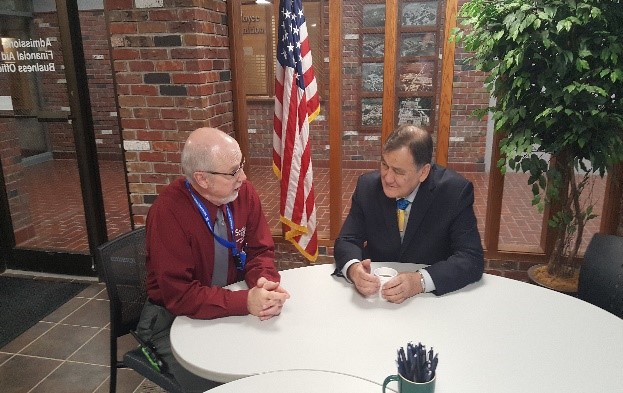
John Pierce (SCC Energy Generation Operations Chair) & Robin Podmore (IncSys President/CEO)
Dr. Paul Illich (SCC President) Opened the ceremony with Welcoming Remarks followed by Ed Koster (SCC Milford Campus Director) who gave the attendees the Campus Update Report.
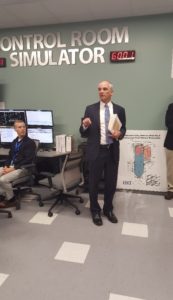
Dr. Paul Illich
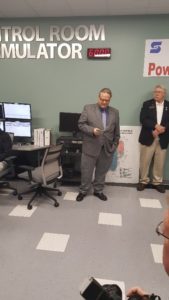
Ed Koster
John Pierce (Energy Generation Operations Program Chair) made remarks regarding the dedication and was thankful to IncSys and PowerData for the contributions of the PowerSimulator tool (Hypothetical Cascadia Model) and training program developed by IncSys that SCC will utilize in their curriculum sometime possibly in the fall of 2018 or spring of 2019.
Robin Podmore was then introduced to the attending participants and they were given a demonstration on how the PowerSimulator functions in real-time operations.
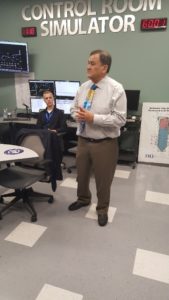
Robin Podmore
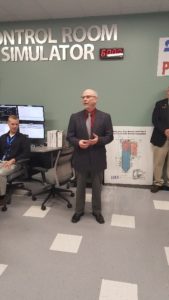
John Pierce
IncSys has been developing and testing operator training materials and scenarios for the Cascadia System since 2012 with high reviews and success in the industry by real Operators who run the grid system all across North America.
The Cascadia System includes a combination of hypothetical rural, commercial, residential, light load industrial and heavy industrial loads. It also includes different mixes of hypothetical generating plants (coal, gas, nuclear, hydro, CTs, wind farms and PV solar farms) and substations and transmission lines layered on the actual geography of Washington State. The power is delivered to customers through 52 hypothetical substations and 2700 miles of high voltage 500, 230 and 115 kV hypothetical transmission lines.
Three of the Top SCC students were trained on several contingency and emergency operational tasks that a normal operator would have to perform using the simulator under the guidance of Robin Podmore. One of the students was serving as the Reliability Coordinator while the other two students were functioning as the TOP.
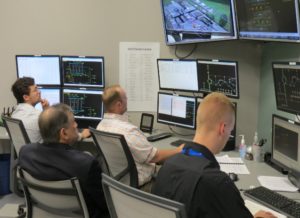
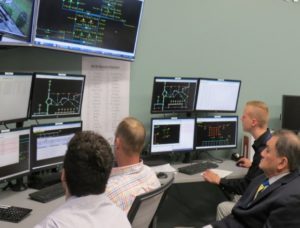
SCC’s Energy Operations Control Room also has a separate classroom where the students perform Power Plant Operations via their Generation Plant Simulator tool in conjunction with the IncSys/PowerData Power Simulator and the students have alarms that sound off and they also use three-way communications between the power plant and the actual Transmission Control Center making the scenarios and events for the students engaging, realistic and challenging as if they were dealing with real life scenarios in the area of System Operations.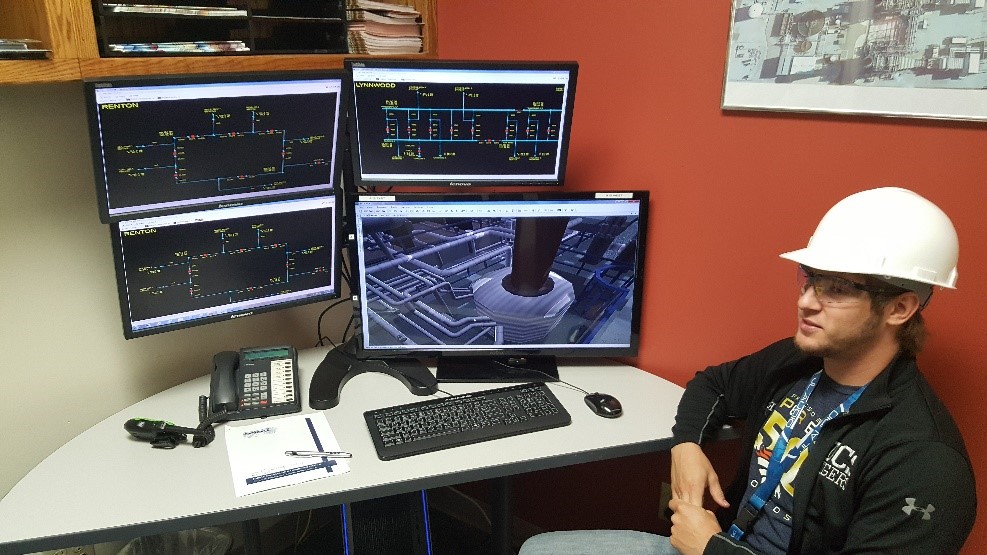
SCC Student in the Power Plant Simulator Room
SCC is committed to its mission of transforming students and the diverse communities it serves through accessible, dynamic and responsive pathways to career and technical, academic transfer and continuing education programs which are built upon the core values of Excellence, Integrity, Innovation, Inclusion, along with Stewardship and Accountability. IncSys and the PowerData team are glad to become apart of this great process to help build future students into Power System Operators/Dispatchers in the industry.
Southeast is a vibrant two-year public institution of higher education serving a primary area of 15 counties in southeast Nebraska. It offers multiple locations and continues to expand its online opportunities. With high-quality career/technical and academic programs and very affordable tuition and fees, SCC provides students with tremendous opportunities to create their futures through the obtainment of new knowledge, skills and awareness. Their unique blend of career/technical programs will provide students with the skills necessary to be successful in the workforce. Their programs provide students with opportunities to work with the latest equipment and technologies. Students enrolled in career/technical programs also receive high-quality instruction in academic areas to ensure they have both the technical and academic skills necessary to succeed at different organizational levels and in a variety of dynamic work environments. The first two years of a four-year degree represent the essential academic foundation.
SCC’s Energy Generation Operations program can accommodate up to 45 students at once and teaches the common skills necessary to work at all three types of power plants.
Pierce said the program has graduated 146 students since 2011.
The new PowerSimulator allows students to see the complete operation of an entire coal power plant. It ties into the system the college already had, created by engineers in South Africa, which simulates nuclear and wind power set-ups, giving students the chance to see the power plants in first-person perspective, as if they were actually standing on-location looking at the equipment.
The simulator uses hypothetical systems—not a replica of the nation’s actual power grid—to keep critical information out of the wrong hands.
“When you work with hypothetical systems, you have to come up with all sorts of stories and make believe,” IncSys President Dr. Robin Podmore said, but the systems still have to be believable and portray real problems so students can learn real solutions.
“If a power system operator makes a serious operating error, then blackouts can occur,” Podmore said.
Students who complete the program are then required to take a 125-question test given by the U.S. government’s North American Reliability Corporation (NERC). They must pass with a 75 percent or higher in order to become certified to run the U.S. power grid.
“These companies are very particular about the people they hire,” Pierce said.
Podmore said IncSys is working with IEEE Smart Village on power solutions all around the world to help those who have never had electrical power—and are living on $1 to $2 a day.
“There’s a worldwide need for safe electrical power,” Podmore said.
IncSys and the PowerData team are proud to become a part of the SCC Energy Generation Operations team and we are looking forward to helping other Community Colleges and Universities across the country to utilize the IncSys curriculum and the PowerSimulator in the classroom to help build the future System Operators into the power industry with the right skill sets and tools required for them to perform their jobs effectively.
Below is a link to an article that SECC shared with us:
